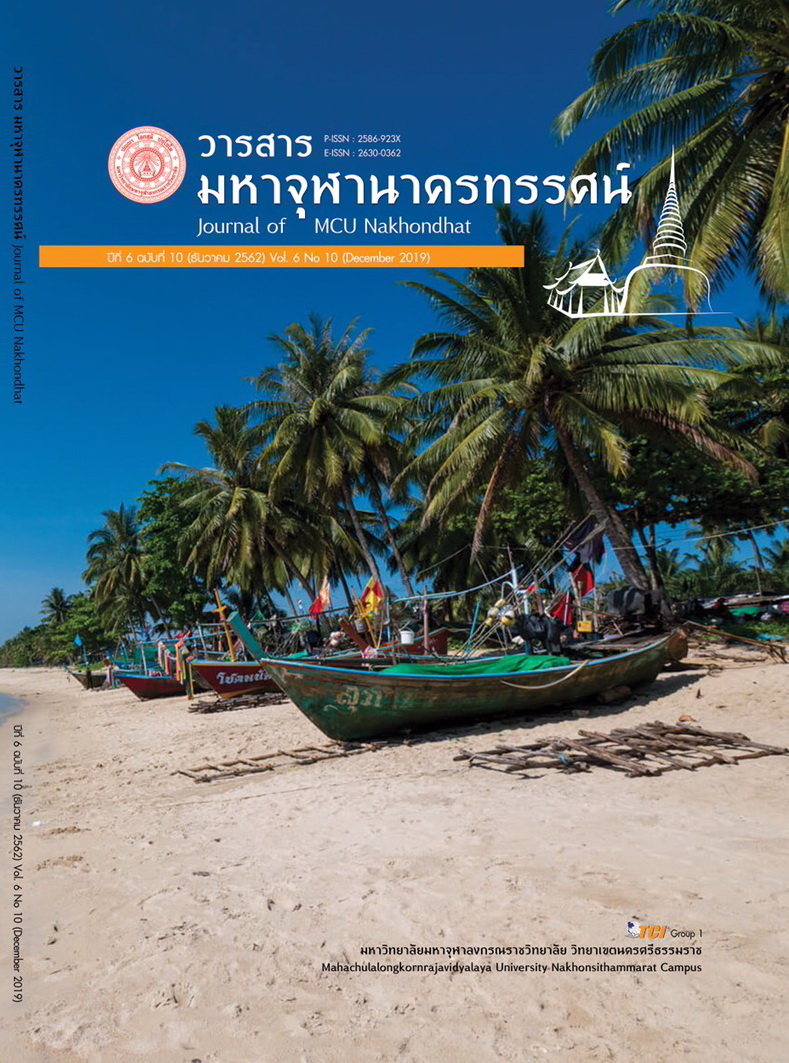THE MODEL IN DRIVING AGRICULTURAL SUFFICIENCY ECONOMIC PHILOSOPHY ACCORDING TO BUDDHADHAMMA OF NAKHONPHANOM PROVINCE
Main Article Content
Abstract
The research entitled: the model in driving agricultural sufficiency economy philosophy according to Buddhadhamma of Nakhonphanom Province, aims: 1) to study the condition of model of agricultural sufficiency economy philosophy of Nakhonphanom Province; 2) to develop a model in driving agricultural sufficiency economy philosophy of Nakhonphanom Province according to Buddhadhamma; and 3) to present the model in driving agricultural sufficiency economy philosophy of Nakhonphanom Province according to Buddhadhamma. It was a Qualitative Research by in-depth interviews with 19 Key-Informants and Focus Group Discussion of 8 experts. The tools used in the research were an interview-form as well as focus group discussion. The collected data were analyzed by content analysis, presents descriptive data, categorization and systematic synthesis. And finally, it was to find common issues and explain by writing in essay
The findings of the research as follows:
- The movement of sufficiency economy principle in agricultural sector, in the agriculture office in Nakhonphanom province gives the support the policy from monoculture to integrated planting , will help distribute the risk of low prince of agricultural products by planting the integrated plants that will help the entrepreneurs of modern farmers get the success and sustainability.
- The model development of modern farmers matches with seven national strategies and eight provincial strategies by 1) relying on agricultural entrepreneurs, 2) to develop the area which changes the monoculture , 3) to support to plant the integrated planing, 4) to develop the knowledge for agricultural aspect and integrate with Buddhadhamma.
3. The model for movement of sufficiency economy principle in agricultural sector according to Buddhadhamma as following model 1) the integrated learning model, 2) the Buddhist market management, 3) the media of agricultural products distribution 4. To develop the agricultural model to Buddhist ethics of the best sampled sufficiency economy.
Article Details
References
กระทรวงเกษตรและสหกรณ์. (2539). เกษตรกรรมคือวิถีชีวิตแห่งสังคมไทย. เรียกใช้เมื่อ 27 กันยายน 2562 จาก https://www.moac.go.th/king-king_thaiagri-files-391991791793
ศิริพร โสมคำภา. (2557). แนวทางการพัฒนาเศรษฐกิจชุมชนด้านการเงินและการบัญชี เพื่อความยั่งยืน: กรณีศึกษา กลุ่มตัดเย็บเสื้อผ้าบ้านคลองแตงโม ตำบลโกสัมพี อำเภอโกสัมพีนคร จังหวัดกำแพงเพชร. ใน รายงานสืบเนื่องการประชุมวิชาการระดับชาติ สถาบันวิจัยและพัฒนา มหาวิทยาลัยราชภัฏกำแพงเพชร ครั้งที่ 1. มหาวิทยาลัยราชภัฏกำแพงเพชร.
สำนักงานจังหวัดนครพนม. (2553). ยุทธศาสตร์การพัฒนาจังหวัด. เรียกใช้เมื่อ 27 กันยายน 2562 จาก http://www2.nakhonphanom.go.th/content/cate/7
สุภารดี สวนโสกเชือก. (2558). การพัฒนาสมรรถนะของผู้นำชุมชนในการบริหารจัดการเศรษฐกิจชุมชนใน จังหวัดสุรินทร์ตามแนวเศรษฐกิจพอเพียง. ใน รายงานการวิจัย. มหาวิทยาลัยเทคโนโลยีราชมงคลอีสาน สำนักวิทยบริการ และเทคโนโลยีสารสนเทศ.
เอกชัย พุมดวง. (2557). การกระบวนการเรียนรู้ภูมิปัญญาท้องถิ่นแบบมีส่วนร่วมตามแนวเศรษฐกิจชุมชนของกลุ่มอาชีพ ในตำบลโคกโคเฒ่า อำเภอเมือง จังหวัดสุพรรณบุรี. ใน รายงานการวิจัย. มหาวิทยาลัยราชภัฏสวนดุสิต สำนักวิทยบริการ และเทคโนโลยีสารสนเทศ.


